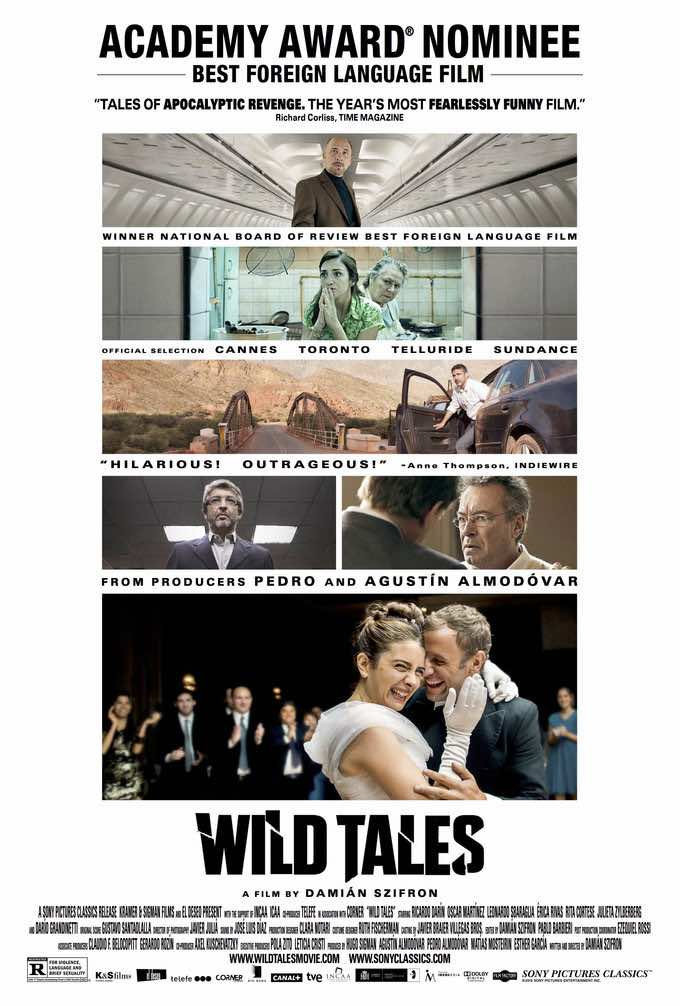 Wild Tales, which was nominated for an Oscar in the Best Foreign Language Film category, is a series of six stories that explores themes of revenge through dark humor. Director Damián Szifrón takes an unflinching look at the “double moral” that pervades in Argentina — and much of Latin America, for that matter. The dark comedy explores human behavior when pushed to its limit and has a critical take of the current version of social relations in Argentina. The film’s characters all seem plagued by a deep sense of injustice, which pushes them to the edge.
Wild Tales, which was nominated for an Oscar in the Best Foreign Language Film category, is a series of six stories that explores themes of revenge through dark humor. Director Damián Szifrón takes an unflinching look at the “double moral” that pervades in Argentina — and much of Latin America, for that matter. The dark comedy explores human behavior when pushed to its limit and has a critical take of the current version of social relations in Argentina. The film’s characters all seem plagued by a deep sense of injustice, which pushes them to the edge.
The first story, “Pasternak” focuses on injustice at the individual level. A runway model Isabel (María Marull) checks into a flight and strikes a conversation with music critic Salgado (Dario Grandinetti). The conversation quickly reveals they have a common acquaintance that they both have wronged — she cheated on him and he wrote a life-changing negative review. Soon, more people on the plane find they are part of the coincidence. The shocking opening story is short and to the point, awakening the audience to a different kind of world, one with blurred social boundaries and a rather twisted sense of humor.
“The Rats” is the second story, featuring a couple of female leads — proof that outrage and overheated reactions do not depend on testosterone alone. A waitress at a roadside small restaurant, Moza (Julieta Zylberberg), sees a man (Cesar Bordon) from her past walk into the restaurant. His complete disrespect for the server will have you rooting for her and the cook (Rita Cortese), who suggests a macabre plan of action. The next story is a personal favorite, “Road to Hell” where road rage and class disputes merge into an epic battle between the haves and have nots. The lengthier of these stories is “Bombita” where Simón (Ricardo Darín), a civil engineer who demolishes buildings for a living, takes a moral stand against the transit bureaucracy in Buenos Aires. This story will also have you questioning what is just and what is not and how those spheres overlap with what is legal and socially acceptable.
The last two stories “The Deal” and “Til Death Do Us Part” present a scathing portrayal of the upper echelon. In both, Szifrón invites the audience to judge the paradoxical circumstances that push characters to the brink and makes them act out in extreme ways. The laughs come from Schadenfreude, but in the despair of these characters you will also find a moment to question whether social inequality serves any social purpose worth preserving — for both ends of the spectrum. For instance, in “The Deal” a rich father (Oscar Martínez) who is willing to do anything to save his son from going to jail, ends up being blackmailed by his lawyer, a long-time employee and even a state prosecutor. The twist in “The Deal” will have you second-guessing who are the winners and losers.
In the closing story, “Til Death Do Us Part” well-to-do bride Romina (Érica Rivas) finds out that her newly minted husband Ariel (Diego Gentile) was unfaithful with one of the more attractive wedding guests. The discovery sends her on a rampage that blows up the entire wedding and will have you swept up for the complicated ride of love and jealousy. Szifrón’s storytelling is effective, with each piece cutting to the bone. The stories are short enough to keep even those with short attention spans entertained. Szifrón has a knack for spotting interesting stories to tell that deliver a punch, even if verging on the blunt side.
The score, courtesy of Gustavo Santaolalla, is one that heightens both the tension and humor. Take, for instance, the opening story. When the twist is revealed, a slinky number reminiscent of a western soundtrack will get you excited for what’s to come. The film is a co-production that includes El Deseo Production Company, the outfit headed by Pedro and Agustín Almodóvar, so it should be no surprise these stories are seeming tragedies that could have been plucked from the headlines and imbued with a dark, even playful sense of humor.
At its core, Wild Tales deals with the infuriating consequences of lived social inequality at all levels. An uncompromising look at the effects of corruption in government, personal and familial relationships, this movie echoes a disgruntled majority that does not stand for abuse of authority, either state-sanctioned through bureaucratic apparatuses or via economic inequality. It will also echo with international audiences because it presents universal situations that most will find themselves relating with.
Wild Tales runs 122 minutes long, is in Spanish with English subtitles and is rated R (some violent revenge throughout and a bit of sexuality). It opens in South Florida on March 20th at the Coral Gables Art Cinema, O Cinema Miami Beach, Regal South Beach, and Regal Shadowood. For screenings around the country click here. Wild Tales was the opening night film at Miami Dade College’s 32nd Miami International Film Festival. Sony Pictures Classics provided a DVD screener last year for awards consideration.
Screening Update: Wild Tales finally comes to the Broward-based indie art house, Cinema Paradiso – Fort Lauderdale on May 1. Here’s ticket information.












This is fantastic. I enjoyed your insights on such an intricate and amazing film. Bravo!
Hi regina, thank you for your comment! Hope you also enjoy the film
The film is amazing.
I agree, Mike D!
I loved the movie, especially the wedding sequence was… interesting haha. Great review!